- Home
- David Leavitt
Arkansas
Arkansas Read online
Table of Contents
Title Page
Table of Contents
Copyright
Dedication
Author's Note
Epigraph
The Term Paper Artist
I.
II.
III.
The Wooden Anniversary
Saturn Street
Copyright © 1997 by David Leavitt
All rights reserved
For information about permission to reproduce selections from this book, write to Permissions, Houghton Mifflin Company, 215 Park Avenue South, New York, New York 10003.
Library of Congress Cataloging-in-Publication Data
Leavitt, David.
Arkansas : three novellas / David Leavitt.
p. cm.
Contents: The term paper artist—The wooden
anniversary—Saturn Street.
ISBN 0-395-83704-9 ISBN 0-395-90128-6 (pbk.)
1. Gays—United States—Fiction. I. Title.
PS3562.E2618A89 1997
813'.54—dc21 96-44315 CIP
Printed in the United States of America
QUM 10 9 8 7 6 5 4 3 2
Book design by Melodie Wertelet
A portion of “The Wooden Anniversary” originally appeared—as “Podere”—in Italian Pleasures (Chronicle Books, 1996).
“Milordo Inglese" from Poems about People or England Reclaimed by Osbert Sitwell, courtesy of David Higham Associates.
Poems by E. M. Forster, courtesy of King’s College, Cambridge, and the Society of Authors as the literary representatives of the E. M. Forster Estate.
FOR
MARK MITCHELL
Author's Note
For information concerning Lords Henry and Arthur Somerset, as well as Jack the Ripper, I am indebted to the following sources: Prince Eddy and the Homosexual Underground by Theo Aronson (John Murray, 1994), The Cleveland Street Scandal, by H. Montgomery Hyde (W. H. Allen, 1976), The Cleveland Street Affair by Colin Simpson, Lewis Chester, and David Leitch (Weidenfeld and Nicolson, 1977), and The Complete Jack the Ripper by Donald Rumbelow (W. H. Allen, 1976).
“I should like to flee
like a wounded hart
into Arkansas.”
attributed to Oscar Wilde,
near the end of his life
The Term Paper Artist
I.
I WAS IN TROUBLE. An English poet (now dead) had sued me over a novel I had written because it was based in part on an episode from his life. Worse, my publishers in the United States and England had capitulated to this poet, pulling the novel out of bookstores and pulping several thousand copies.
Why should I have been surprised? My publishers were once Salman Rushdie’s publishers too.
I didn’t live in Los Angeles then. Instead I was on an extended visit to my father. After his retirement a few years ago, he moved down from the Bay Area to Glendale because his wife, Jean, teaches at a university not far from there. They own a newish house, rambling and ceremonial, rather like a lecture hall. This house, which originally belonged to a movie producer, includes a “media room,” the electronic controls of which are so complex that even after five years, neither one has figured them out; a lighting system more various and subtle than that of most Broadway theaters; a burglar alarm they can never quite explain to Guadalupe, the cleaning lady, who seems always to be tripping it accidentally. The trouble may be that the house was built in the mid-eighties, when technology was already amazing but not yet simple. And because technology, like money, is measured by our needs—had she lived in our age, George Eliot might have said that—most of this gadgetry, by the turn of the decade, was obsolete. These days machines, like clothes, seem to lose their value merely with the passing of seasons.
In any event, it was to my father, and his complicated house, that I had come that fall. I had come because I couldn’t write in my own house, and also because I was dating an actor: an actor who, as it happened, had gotten a part in a movie almost as soon as I’d arrived, then flown off to spend six weeks in the Andes. And as I was inclined neither to visit him in the Andes, nor to return to New York, where I had fallen into bad habits, I settled down into the life of my father’s guest room, which is a pleasant, lethargic one except in one detail: because New York wakes up three hours earlier than California, when I got out of bed in the mornings, it was invariably to find faxes of a not very pleasant nature lying outside the door to my room. And this particular morning—the morning of the day I would meet Eric—the fax that lay outside the door to my room was particularly unpleasant. My American publisher, it told me, had decided to suspend publication of the paperback edition of my novel; in spite of the revisions I had made over the summer, in spite of the book already having been announced in the catalogue, “counsel” had decreed it still too dangerous to print.
There was a bad smell in the room, mossy and rotten, as if the fax itself gave off noxious vapors.
I mentioned nothing to my father except the smell. As a rule, I was trying to learn to take blows better, or at least to take them without letting them distort the natural progress of my days. So as usual I had my morning coffee at the local Starbucks. Then I drove around for a while, listening to Dr. Delia, the radio shrink. Then I tried out the computerized massage chair on display at the Sharper Image in the Beverly Center, and then I stopped in at Book Soup on Sunset to thumb through the latest issues of The New Yorker, The New York Review of Books, and The New York Times Book Review, as well as whatever books happened to have landed that morning on the “new arrivals” table. You see, it was terribly important to me in those days to stay abreast of what my confrères in the writing trade were up to. Competitiveness, not to mention a terror of losing the stature I had gained in my early youth, played a much more singular role in my life than I have heretofore admitted. Indeed, I suspect it plays a more singular role in most writers’ lives than they are willing to admit. And the level of success makes no difference. The young poet cringing to learn that his enemy has been awarded the Guggenheim for which he has been turned down is merely a miniature version of the hugely famous novelist cringing to learn that her university colleague has won the Nobel Prize for which she has shamelessly campaigned: we are speaking, here, of the emotions of vacancy, which scale neither enhances nor mitigates; for panic and emptiness (the words are Forster’s) always feel like panic and emptiness, no matter the degree.
After Book Soup, I ate lunch alone at the Mandarette Café on Beverly, then drove over to the UCLA library to research the new novel I was working on, which concerned the aftermath of the Cleveland Street Affair. This was a scandal that took place in London in the years immediately preceding the Oscar Wilde trials. Essentially, in 1889 Her Majesty’s police had stumbled upon a homosexual brothel at 19 Cleveland Street, the clients of which included Lord Arthur Somerset, a major in the Royal Horse Guards and equerry to the prince of Wales, whose stables he supervised. Telegraph boys—one of whom had the astounding name of Charles E. Thick-broom—provided the “entertainment” at this brothel, as well as most of the evidence against Lord Somerset.
My idea was to merge his story with that of his brother, Lord Henry Somerset, who had fled England for Florence ten years earlier after his wife had caught him in flagrante delicto with a boy called Henry Smith. (Lady Somerset would later become a famous temperance advocate.) History has tended to confuse, even to fuse, the brothers, and I was following history’s lead.
So there I sat, in a carrel in the stacks of the UCLA library, with an open legal pad and a pile of books in front of me, doing, if truth be told, very little. Partially this was because by nature I am not a researcher. I grow impatient with facts. And yet I cannot deny the more pressing reason for my indolence: it was fear. An aureole of wo
rried expectancy seemed to surround the prospect of this next novel. I thought I could hear it in the voice of my agent, my editor, even my father. Would I ever be allowed to forget what had happened with While England Sleeps? I wondered. Or would the scandal that had attached itself to the novel’s publication—to quote a helpful journalist—“taint my aura” forever? I couldn’t yet say.
Thus my UCLA afternoon, like all my UCLA afternoons, proceeded. Instead of studying the “blackmailer’s charter,” which in England criminalized “acts of gross indecency between adult men in public or private,” I got a Diet Coke from a vending machine. Instead of reading up on the Italian Penal Code of 1889, by virtue of which Italy became such a mecca for homosexual emigres, I martyred myself to Publishers Weekly. Instead of investigating Florence’s amazingly casual attitude toward sodomy, I investigated whether anyone sexy was loitering in the photocopy area. Finally around three, having devoted at best a paltry hour to the skimming of history books and the jotting down of notes, I left. Impending traffic on the 210 was my excuse. And yet somehow I managed, as always, to find time for a visit to the Circus of Books on Santa Monica Boulevard, where I wasted just enough minutes browsing at the porn magazines to ensure getting stuck in the same rush hour traffic I’d departed the library early to avoid. It was six-thirty by the time I pulled into my father’s driveway.
Feeling rather cross, I got out of the car and went inside. Three people I didn’t know were drinking iced tea in the living room. They looked at me. I looked at them. “Hello,” we all said, and then Jean and my father—one bearing a platter of raw vegetables, the other a bowl of mushroom pâté—emerged through the swinging door from the kitchen. “Oh, hi, David!” Jean called cheerfully, and introduced me.
The three people, all of whom stood, turned out to be Cynthia Steinberg, a sociology professor at Rutgers and a colleague from Jean’s graduate school days; her husband, Jack; and their son Eric. Eric, I quickly learned, was an economics major at UCLA who hoped to attend Stanford Business School; and as my father has taught for several decades at that august institution, this little drinks party had been arranged so that Eric could ask questions, get advice, and perhaps (this is my conjecture; it was never stated) ingratiate my father into writing him a letter of recommendation.
Now, it has actually become quite a common occurrence for old friends of my father’s and Jean’s to bring their children over for academic advice. And probably because I was so used to the well-heeled, eager-eyed boys and girls I tended to encounter, all of them hell-bent on making an executive impression, Eric surprised me. For one thing, he had large, placid blue eyes with which, as I accepted Jean’s proffered glass of tea, he stared at me: a stare that had no caution in it. Eric wasn’t exactly handsome; his nose obtruded, and he had thick, stupid lips—the best for kissing. Still, imperfect features can fit together with a mysterious harmony that is altogether more alluring than beauty. And it was this somewhat cobbled-together aspect of his appearance that attracted me: his long legs in khaki pants, which he could not keep still; his brown loafers, above the scuffed edges of which, when he slung one leg over the other, a tanned and hairy ankle was exposed; his too-short tie and brown jacket; and the hair that fell into his eyes: yes, I am back at his eyes; I always end up back at his eyes. For what took me off guard, as I sat across from him (Jean was talking about GMATs), was their frankness. They were like the eyes of children who are too young to have learned that it is not nice to peer. And Eric did peer, at me, at my father, at the garden through the plate-glass windows. His mother asked all his questions for him. He only nodded occasionally, or muttered a monosyllable.
It took me ten minutes before I realized how stoned he was.
Eventually talk of business schools dried up. “So are you living in L.A. now, David?” Eric’s father asked.
“Just visiting,” I said.
“David lives in New York,” my father said brightly. “He’s out here working on his new book.”
“Oh, you’re a writer?” This was Eric speaking—the first question he’d asked since I’d arrived.
“When I’m able to work,” I said, “I call myself a writer.”
“David’s done very well for himself,” Mrs. Steinberg informed Eric. “You know I wasn’t going to say anything—I figure you must hear it all the time—but I really loved Family Dancing."
“Thanks. Actually, I don’t hear it all the time.”
“What do you write?” Eric asked.
“Novels, short stories,” I said, and braced myself for the question that would inevitably follow: What kind of novels? What kind of short stories? But Eric only smiled. His teeth were very large.
“And you make a living at it?”
“Usually.”
“What did you major in?”
“English.”
“Great. Where’d you go to school?”
“Yale.”
“Cool. My teacher—I’m taking this English lit class? My teacher went to Yale. Her name’s Mary Yearwood. She’s probably about your age.”
“I don’t know her.”
“She’s an expert on Henry James. Did you go to grad school?”
“No. I pretty much started publishing out of college.”
“I’d really like to read some of your books. Maybe you could tell me the titles.”
“Well, we’d better be going,” Mrs. Steinberg said, rising very suddenly from the sofa. “We’ve kept you folks long enough.”
“No, no.” My father did not sound very convincing, however, and soon the Steinbergs were moving toward the door, where farewells were exchanged. Meanwhile I hurried into the kitchen and wrote the titles of my books on a memo pad advertising Librax.
“Thanks,” Eric said, as I handed him the list. “I’ll definitely pick one up.” And he held out his hand.
We shook. His handshake was—everything about Eric was—long, loose, generous.
They left.
“A nice kid,” my father said.
“Very nice,” Jean agreed. “Still, Cynthia’s worried. Apparently he’s a whiz with computers—but not exactly verbal.”
“C’s in English won’t get him into Stanford,” my father said. (We had all strolled into the kitchen.)
“What does English matter if you want to go to business school?” I asked.
“It didn’t used to. But then there were always too many technicians, and so what we’re looking for now are all-around students with a good background in the humanities. You, for instance, my boy”—he put a hand on my shoulder—“would probably have had an easier time getting into Stanford than Eric Steinberg will.”
“But I didn’t want to.”
“I still wish you’d applied. You could have been the first student in the school’s history to get a simultaneous MFA and MBA—”
“Yes, I know, Dad.”
Jean went up to her study while my father took some yellow beets from the freezer and put them in a microwavable dish.
“By the way, do you still have that stink in your room?” he asked.
“Yes,” I said. “It’s the strangest thing. I started noticing it after the tremor.”
“Tremor! What tremor?” He walked over to the intercom. “Jean, did you feel a tremor?” he shouted.
“No, I didn’t!” she shouted back. For some reason they always yelled at each other through the intercom, as if they didn’t quite trust it to carry their voices.
After that I changed my routine. Instead of wasting my mornings on the road, I went directly from Starbucks to the library, and stayed there until lunch.
I wish I could say I got a little more work done over the course of those days than I might have otherwise, but I didn’t. Instead I spent most of my time looking up various literary acquaintances in the periodicals index to see how much more work they had published in the previous year than I had; or chasing down those bad reviews of While England Sleeps that my publisher had had the good sense not to forward to me (the worst of these, in
The Partisan Review, was by one Pearl K. Bell, whose son had been my classmate); or reading and rereading the terrible press I’d gotten during the lawsuit. Also, I looked every day to see if anyone (Eric?) might have checked out any of my books. (No one had; I took the occasion to autograph them.) After which I’d lunch, drive around, and end up more often than not (no, I am lying: every day) at the Circus of Books.
Coming home one evening, I walked through my father’s door only to hear Jean shouting through the intercom that I had a phone call.
“It’s Eric,” Eric said when I picked up. Not “Eric Steinberg,” just “Eric”—as if he took it for granted that I’d remember him.
“Eric, how’re you doing?”
“All right, yourself?”
“Great.”
“Cool.”
There was a silence. Naturally I presumed that since Eric had called me, he would also shoulder the responsibility for keeping the conversation going. He didn’t.
It soon became apparent that if I didn’t say something, no one would.
“So what are you up to?”
“Oh, you know, the usual. Studying. Partying.” Another silence. “So I bought one of your books.”
“Really. Which one?”
“ The Secret Language of the Cranes. ”
“Oh, right.”
“Yeah.”
Long pause.
“And did you like it?”
“Yeah, I thought it was pretty cool. I mean, to write all that! It takes me an hour to write a sentence.”
“It’s just a matter of practice,” I said. “Like sports. Are you an athlete?”
“Not really.”
“I was just asking because you looked to be in pretty good shape.”
“I swim three times a week.”
“At UCLA?”
“Uh-huh.”
“Is there a good pool?”
“Pretty good. Olympic size.”
More silence.
“Well, I appreciate your calling, Eric,” I said. “And buying the book. Most people who say they’re going to never bother.”

 Shelter in Place
Shelter in Place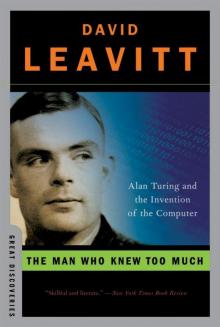 The Man Who Knew Too Much: Alan Turing and the Invention of the Computer (Great Discoveries)
The Man Who Knew Too Much: Alan Turing and the Invention of the Computer (Great Discoveries)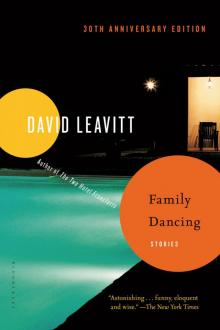 Family Dancing
Family Dancing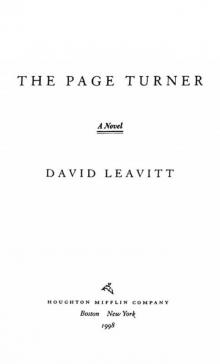 Page Turner Pa
Page Turner Pa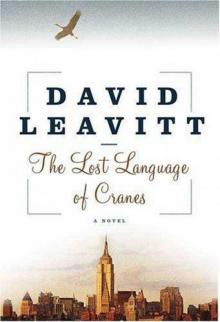 The Lost Language of Cranes: A Novel
The Lost Language of Cranes: A Novel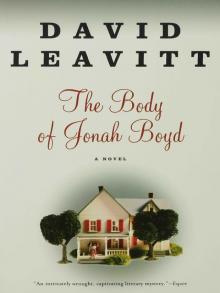 The Body of Jonah Boyd
The Body of Jonah Boyd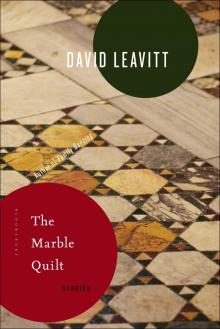 The Marble Quilt
The Marble Quilt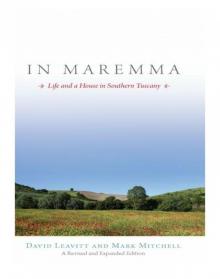 In Maremma
In Maremma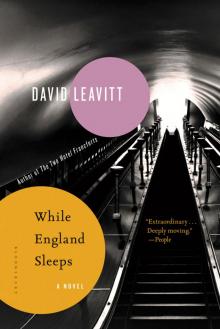 While England Sleeps
While England Sleeps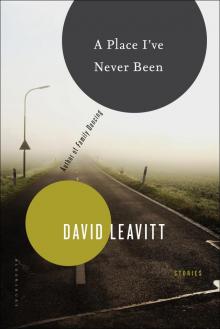 A Place I've Never Been
A Place I've Never Been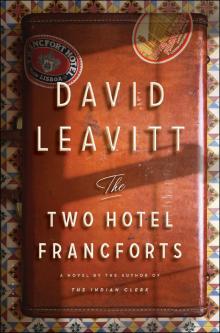 The Two Hotel Francforts
The Two Hotel Francforts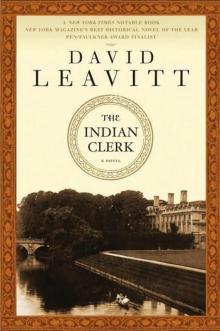 The Indian Clerk
The Indian Clerk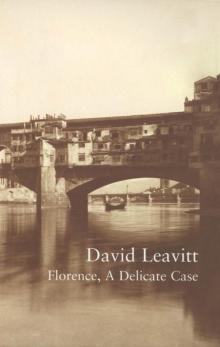 Florence
Florence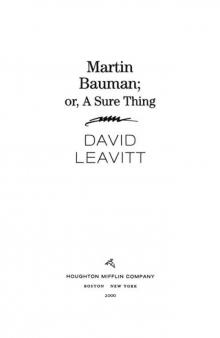 Martin Bauman
Martin Bauman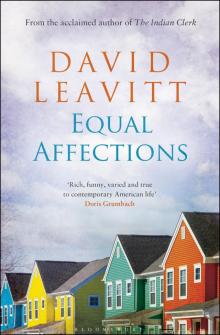 Equal Affections
Equal Affections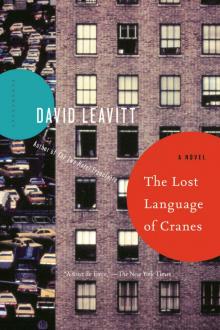 The Lost Language of Cranes
The Lost Language of Cranes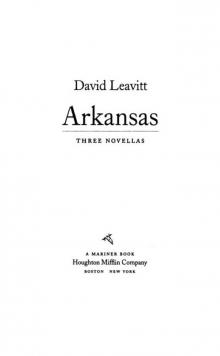 Arkansas
Arkansas